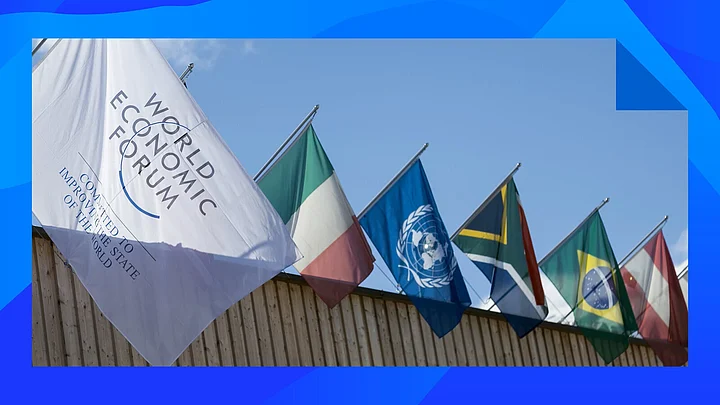The World Economic Forum's (WEF) annual meeting in Davos, Switzerland, from January 15 to 19 is set to witness the presence of UN Secretary-General António Guterres, President of the World Bank Ajay Banga, Director-General of the World Health Organisation Tedros Adhanom Ghebreyesus, and political leaders from India, the US, China, France, and Sri Lanka.
With about 3,000 participants, including investors, business leaders, politicians, economists, celebrities, and journalists, the WEF provides a platform for a variety of stakeholders to discuss global and regional socio-economic issues across hundreds sessions over five days.
The Indian delegation features Union minister of Women and Child Development Smriti Irani, Minister of Railways Ashwini Vaishnaw, and Petroleum and Natural Gas Minister Hardeep Singh Puri, and Maharashtra Chief Ministers Eknath Shinde, Telangana CM Revanth Reddy, and Karnataka CM Siddaramaiah.
RBI Governor Shaktikanta Das, and ministers from Uttar Pradesh, Tamil Nadu, and Telangana will also attend, alongside business giants including Gautam Adani, Sanjiv Bajaj, Kumar Mangalam Birla, N Chandrasekaran, and Nandan Nilekani.
Over 40 finance ministers, 16 central bank governors, 30 trade ministers, and the World Trade Organisation Director-General Ngozi Okonjo-Iweala will also participate in the five-day session, which will focus on the ‘back to basics’ approach, fostering open and constructive dialogue among government, business, and civil society leaders.
Global leaders such as French President Emmanuel Macron, Chinese Premier Li Qiang, European Commission President Ursula von der Leyen, Ukrainian President Volodymyr Zelenskyy, US Secretary of State Antony Blinken, and US NSA Jake Sullivan will join, along with key foreign ministers from the Middle East.
The WEF says that it aims to drive dialogue and cooperation on global factors, including economic growth, climate action, energy security, technology governance, and human development.
More than 1,600 business leaders, including 800 CEOs and 150 innovators and tech pioneers, will discuss addressing the challenges posed by misinformation and societal polarisation, which are identified as significant immediate risks in the WEF's 'Global Risks Report.'
In the case of India, "misinformation and disinformation" are highlighted as the top threat in the next two years, followed by infectious diseases, illicit economic activity, income inequality, and labor shortages.
One of the key agendas of the summit is to find an approach to address security crises around the world while tackling the underlying forces of fragmentation.
Discussions will also revolve around how government, business, and civil society can collaborate on a new economic framework to prevent a decade of low growth and prioritise the well-being of individuals.
(At The Quint, we question everything. Play an active role in shaping our journalism by becoming a member today.)
